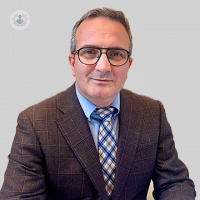What to do when the thyroid goes into hyperdrive: a guide to hyperthyroidism
Escrito por:The thyroid is found between the clavicle and Adam’s apple in your throat. It controls the metabolic rate of the body (how your body converts food into energy), which in turn determines how we function, grow, and develop. When the thyroid stops working as it should, it disrupts the entire body system and greatly impacts your health. Dr Edson Nogueira, consultant endocrinologist in London, explains the condition and ways to treat it.

The thyroid is a butterfly-shaped endocrine gland, which is a hormone producer in the body. It converts the mineral iodine -- which is present in common foods like milk, eggs, salt, and fish – into hormones called thyroxine and triiodothyronine. It works in conjunction with the parts of the brain called the hypothalamus and the pituitary gland in a system creatively called the hypothalamic-pituitary-thyroid axis (or HPT axis).
The thyroid can either underperform, called hypothyroidism, or overperform, called hyperthyroidism. With hyperthyroidism, the gland produces too much of the thyroid hormones in the bloodstream that your body cannot regulate and thus they flood your system.
Signs of hyperthyroidism
When the thyroid is overactive, the neck will appear swollen as the gland is engorged, also known as goitre. Patients with undiagnosed hyperthyroidism may not think that the thyroid specifically is having an issue, due to the initial symptoms which could be mistaken for other illnesses like allergies or flu. These symptoms are:
- watery and itchy eyes
- swollen throat and pain or difficulty swallowing
- sensitive and itchy skin
- frequent bowel movements
- weight and hair loss
- changes to skin texture
- difficulty with sleep and feelings of fatigue
- sensitivity to heat
- feelings of anxiety or a racing, palpitating heart
It’s important to address hyperthyroidism as without treatment, there can be long-lasting damage to your heart and bones, issues with fertility, and deterioration of vision.
What causes hyperthyroidism, and how can it be treated?
Some pre-existing conditions that may lead to hyperthyroidism:
- Graves’ disease, is a chronic autoimmune disease specifically attacking the thyroid gland and making it produce too much thyroxine. This is the most common cause of hyperthyroidism.
- Multinodular goitre is when the thyroid gland is enlarged with growths called thyroid nodules. They can be benign or cancerous.
Hyperthyroidism could also be due to too much iodine in the body, either from your diet, current medications, or previous exposure to radiation therapy in the head and neck.
For treating the condition, there are anti-thyroid medications that can put a dam to overflow of thyroxine and triiodothyronine in the body, such as methimazole and propylthiouracil. Treatment takes as long as a year to 18 months, after which the patient is slowly weaned off of the medication. The condition may go away forever, but there is also the risk of it coming back, as well as the chemicals causing damage to the liver.
An alternative, permanent option is a thyroidectomy, where part or all of the thyroid is excised. It’s not usually for treating hyperthyroidism but remains the best option for pregnant people, though it may cause damage to the vocal cords.
Ironically, one of the treatments for an overactive thyroid is iodine radiation therapy, in which a dose of radioactive iodine is swallowed and then begins attacking the gland’s cells to hinder its production of hormones. One dose should be sufficiently effective, and results develop over one to six months. Due to its purpose and effects, the thyroid gland is consequently destroyed to the point that it can no longer function, let alone overproduce.
Patients who receive iodine radiation therapy or a thyroidectomy have to be prescribed a medication called levothyroxine to replace the thyroid hormones for the rest of their lives.
If you think you may have an issue with your thyroid, Dr Edson Nogueira is available to book for consultation via his Top Doctors profile.


